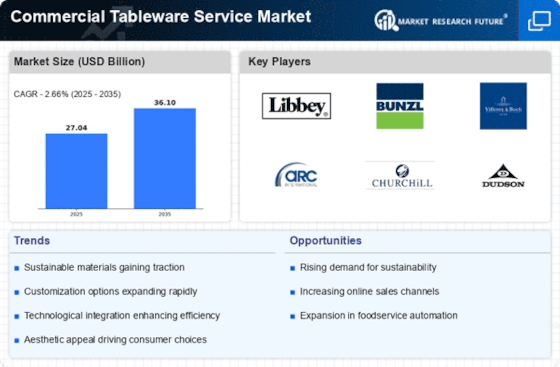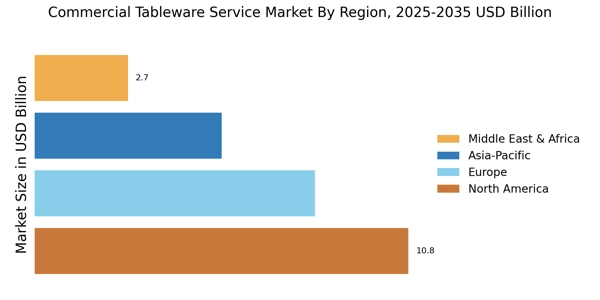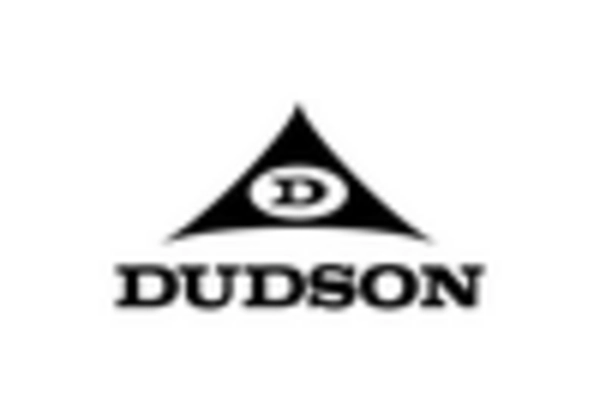Sustainability Initiatives
Sustainability initiatives are becoming increasingly important in the commercial tableware service Market, as consumers and businesses alike prioritize eco-friendly practices. The demand for sustainable materials, such as biodegradable and recyclable tableware, is on the rise. This trend is driven by a growing awareness of environmental issues and the desire for responsible consumption. Data suggests that the market for sustainable tableware is expected to witness substantial growth, as more foodservice establishments seek to align their operations with eco-conscious values. As a result, manufacturers in the Commercial Tableware Service Market are likely to innovate and develop products that meet these sustainability criteria, thereby appealing to a broader customer base.
Emphasis on Aesthetic Appeal
The aesthetic appeal of tableware is increasingly recognized as a crucial factor in the dining experience, driving demand within the Commercial Tableware Service Market. As consumers become more discerning, restaurants and cafes are investing in visually appealing tableware to create memorable dining experiences. This trend is supported by data indicating that establishments with well-designed tableware can enhance customer satisfaction and encourage repeat visits. The market for decorative and unique tableware is expected to grow, as operators seek to differentiate themselves in a competitive landscape. Thus, the focus on aesthetics not only influences purchasing decisions but also shapes the overall branding strategies of foodservice providers.
Growth of Online Food Delivery Services
The expansion of online food delivery services has transformed the way consumers access dining options, thereby impacting the Commercial Tableware Service Market. As more consumers opt for delivery, restaurants are adapting their tableware choices to ensure that food presentation remains appealing even when served off-premises. This shift has led to an increased demand for packaging solutions that maintain the quality and appearance of food during transit. Market analysis indicates that the online food delivery segment is expected to grow significantly, prompting foodservice operators to invest in tableware that aligns with this trend. Consequently, the Commercial Tableware Service Market must adapt to these changing dynamics to meet the needs of both restaurants and consumers.
Technological Innovations in Manufacturing
Technological innovations in manufacturing processes are significantly influencing the Commercial Tableware Service Market. Advances in materials science and production techniques are enabling manufacturers to create tableware that is not only more durable but also more cost-effective. For instance, the introduction of advanced ceramics and composite materials has led to the development of lightweight yet sturdy tableware options. This evolution in manufacturing is expected to enhance product offerings and reduce production costs, thereby benefiting both manufacturers and consumers. As the market continues to evolve, the integration of technology in the production of tableware will likely play a pivotal role in shaping the future landscape of the Commercial Tableware Service Market.
Rising Demand for Foodservice Establishments
The increasing number of foodservice establishments, including restaurants, cafes, and catering services, appears to be a primary driver for the Commercial Tableware Service Market. As dining out becomes a prevalent social activity, the need for high-quality tableware is likely to rise. According to industry reports, the foodservice sector is projected to grow at a compound annual growth rate of approximately 4.5% over the next few years. This growth suggests that more establishments will require durable and aesthetically pleasing tableware to enhance customer experience. Consequently, manufacturers in the Commercial Tableware Service Market may find opportunities to innovate and expand their product lines to meet the evolving demands of these establishments.

















